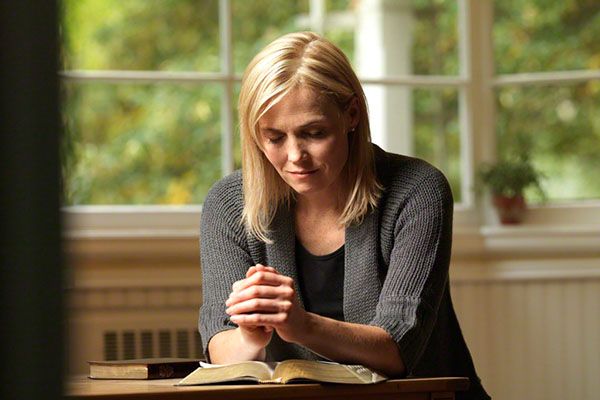Pray Like a Prophet, Part 1
June 21, 2017 • Blog Post
The story of Enos is exceptional for many reasons: A wrestle occurs between man and God, between son and Father. And Enos received revelation on the Nephites’ future. But maybe what is most impressive is the length of the prayer: “All the day long did I cry unto him; yea, and when the night came I did still raise my voice high that it reached the heavens” (Enos 1:4). A prayer like that surely doesn’t feel like it is bouncing off the ceiling before it can reach heaven. So, how can we better tap into that kind of a connection with God? How can we pray like Enos?
In this two-part series, our goal is to learn first the necessary elements of Enos-like prayer, and second to overcome the hang-ups that often happen. We hope that this will illuminate ways to strengthen our prayers and more deeply connect with God.
1) How Can I Pray Like I Mean It?
“True prayer is heartfelt: the words convey our deeply felt desires and are coupled with a commitment to act on the divine guidance we receive.
“Heartfelt prayer comes from the depths of the soul. Our mind and heart are directed toward God with full and complete attention. When we pray from the heart, we are not just saying words or ‘going through the motions’; we are seeking to draw nearer to our Father in Heaven, to commune with Him in a personal and intimate manner. Heartfelt prayer is the furthest thing from a memorized recitation. We do not simply talk at God; rather, we talk with Him. This does not imply a face-to-face conversation as Moses experienced, but it does suggest communing with God by listening to the still, small voice of the Spirit. It means allowing time both during a prayer and after a prayer to hear spiritual promptings.” [Bruce D. Porter, “Did You Think to Pray?” 4 December 2012]
2) How Can I Show God I’m Ready to Speak with Him?
“You don’t need to be a dancer who studies the meaning of movement to recognize the significant symbolism of kneeling. This gesture of humility and reverence does so much for the one kneeling. During a season of my life when that became impossible because of a serious knee injury with its consequent multiple surgeries, I longed for the privilege to kneel again in prayer more than I longed to walk and to dance again. The first time my knee could bend enough to kneel, tears of gratitude poured out. They still do.” [Marilyn W. Berrett, “Earnest Prayer,” 8 June 2010]
3) Why Should I Pray with Intensity?
“All prayers need to come from deep inside our minds and hearts. How offensive it must be to the Lord—who has offered us so much, who stands ready to give every blessing expedient for our good—for us to hurry through our prayers or sleep through them or have our minds wander or our words be casual and disrespectful, such as using you and your instead of Thee and Thou. How often do we forget Him altogether until we have an urgent need? . . .
“Praying with intensity seems to indicate faith that the prayer can be answered. . . . For most of us faith is something we have to consistently work to have. We might attain great faith through a singular experience, but the next time our faith is tried we seem to have to start all over again in really trusting the Lord. But I promise you that if you pray, believing that Heavenly Father is there, that He loves you, and that He can answer all prayers, your faith will grow and it will become stronger, and you will be able to come to a place in your life where you will know these things are true. Believing is the beginning of faith.” [Cheryl C. Lant, “Prayer,” 9 September 2007]
4) How Can I Avoid Repetition in My Prayers?
“When you find yourself getting into a routine with your prayers, step back and think. Meditate for a while on the things for which you really are grateful. Look for them. They don’t have to be grand or glorious. Sometimes we should express our gratitude for the small and simple things like the scent of the rain, the taste of your favorite macaroni and cheese recipe, or the sound of a loved one’s voice.
“Thinking of things we are grateful for is a healing balm. It helps us get outside ourselves. It changes our focus from our pains andour trials to the abundance of this beautiful world we live in.” [Joseph B. Wirthlin, “Improving Our Prayers,” 21 January 2003]
5) How Can I Ask the Right Questions?
“Often what stands between us and answers to our prayers is our failure to ask the right questions. The role of the Holy Ghost is as important in determining what we pray about as it is in bringing the answers we seek. . . .
“Perhaps the greatest revelation of this dispensation was the one Joseph Smith received prompting him to go into the woods and find a place to pray. Having read the injunction in James, he said:
Never did any passage of scripture come with more power to the heart of man than this did at this time to mine. It seemed to enter with great force into every feeling of my heart. I reflected on it again and again, knowing that if any person needed wisdom from God, I did.
“Do you see what is taking place here? Joseph was getting a revelation telling him to go get a revelation. The Spirit was directing him in what he asked, and, because the Spirit was his companion in the asking of the question, he could do it with complete faith.” [Joseph Fielding McConkie, “Finding Answers,” 12 December 2006]




